Description
Medical Hammer: Essential Tool for Neurological and Physical Examinations
A medical hammer is a vital instrument in healthcare, designed to assess reflexes, neurological responses, and joint function. This versatile tool is a staple in clinics, hospitals, and diagnostic centers, offering precision and reliability for professionals. Whether you’re a neurologist, physiotherapist, or general practitioner, understanding the different types of medical hammers ensures accurate patient evaluations. Below, we explore its key variations, including reflex hammer, reflex hamer, reflex tendon hammer, percussion hammer, and knee hammer, highlighting their unique roles in medical practice.
Reflex Hammer: The Standard for Neurological Testing
A reflex hammer is the most recognized type of medical hammer, primarily used to test deep tendon reflexes. Its weighted head delivers controlled taps to areas like the knee (patellar tendon) or elbow (biceps tendon), triggering involuntary muscle contractions. This helps diagnose nerve damage, spinal cord injuries, or neurological disorders.
Modern reflex hammers feature ergonomic handles for a secure grip and adjustable heads for varying pressure levels. Popular models include the Taylor and Babinski hammers, which cater to different clinical preferences. By integrating durability and precision, this tool remains indispensable in routine check-ups and specialized exams.
Reflex Hamer: Addressing Common Misspellings
The term reflex hamer often arises due to typographical errors, but it refers to the same instrument as a reflex hammer. Clinicians and suppliers should be aware of this common misspelling when searching for or documenting the tool. Ensuring correct spelling (“hammer”) improves searchability in medical databases and online marketplaces.
Despite the typo, a reflex hamer serves identical functions—assessing reflexes and aiding in neurological assessments. High-quality versions use stainless steel or rubber heads to deliver consistent results, emphasizing the importance of accuracy in both terminology and clinical application.
Reflex Tendon Hammer: Precision in Deep Tendon Exams
A reflex tendon hammer is engineered for targeted reflex testing. Its compact design allows professionals to focus on specific tendons, such as the Achilles or brachioradialis. The hammer’s triangular or circular head distributes force evenly, minimizing discomfort while eliciting clear responses.
This subtype often includes a pointed tip for sensory tests, adding versatility. For example, neurologists use the sharp end to evaluate peripheral nerve function. Lightweight and portable, the reflex tendon hammer is ideal for bedside exams and emergency settings.
Percussion Hammer: Beyond Reflex Testing
The percussion hammer expands the utility of a medical hammer beyond reflexes. It’s used in percussion techniques to assess organ density, such as lung resonance or liver borders. The broader, flatter head produces audible sounds when tapping the body surface, aiding in detecting fluid accumulation or organ enlargement.
Some percussion hammers include a brush or pinwheel for sensory evaluations, making them multifunctional. This adaptability underscores its role in respiratory, abdominal, and musculoskeletal examinations, proving its value across medical specialties.
Knee Hammer: Specialized Design for Joint Assessments
A knee hammer is tailored for evaluating patellar reflexes, a key component of neurological screenings. Its elongated handle and soft rubber head ensure controlled strikes to the knee’s tendon, producing consistent and measurable responses.
This tool is particularly useful in physical therapy, where monitoring reflex changes tracks recovery progress. The knee hammer’s design reduces slippage during use, prioritizing patient safety and clinician confidence.
Why Choose a High-Quality Medical Hammer?
Investing in a durable, well-crafted medical hammer enhances diagnostic accuracy. Key features to consider include:
- Material: Stainless steel or rubber heads for longevity.
- Ergonomics: Non-slip handles for better control.
- Versatility: Interchangeable heads for varied tests.
Final Thoughts
From the classic reflex hammer to the specialized knee hammer, these instruments are fundamental to patient care. By selecting the right type—whether a reflex tendon hammer for detailed neurology exams or a percussion hammer for broader assessments—clinicians ensure thorough evaluations. Always prioritize quality and precision to maintain professional standards and patient trust.

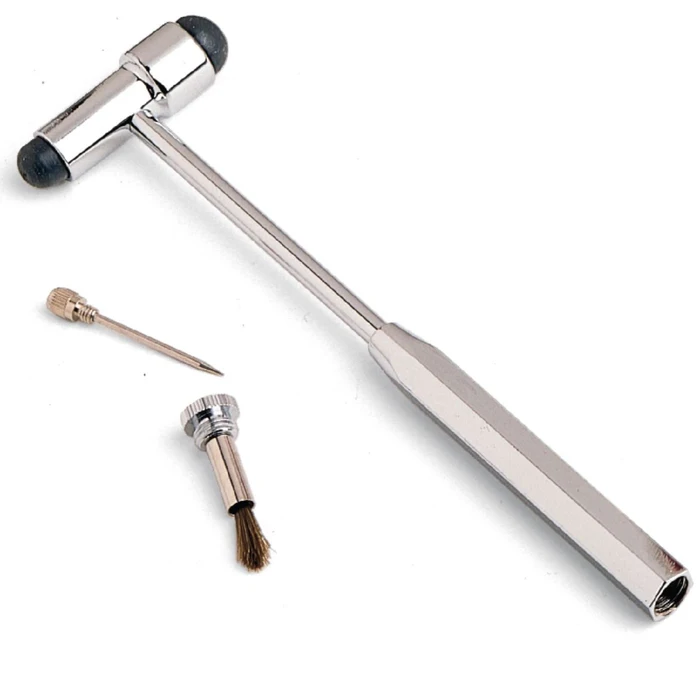
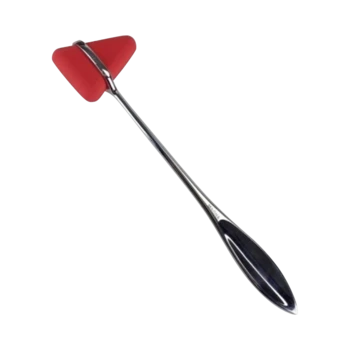
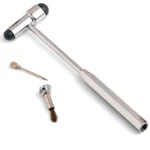

 Pakistan
Pakistan

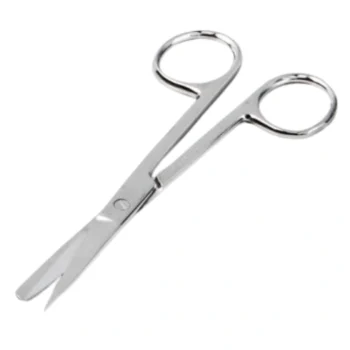


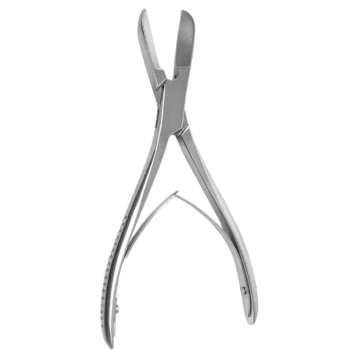


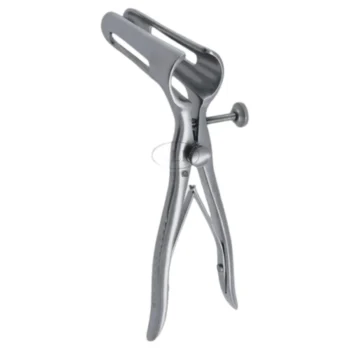
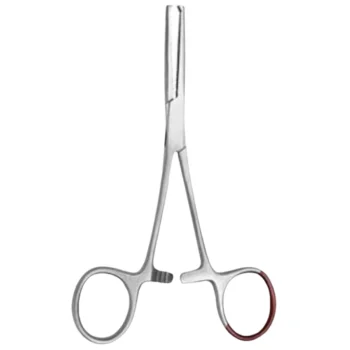

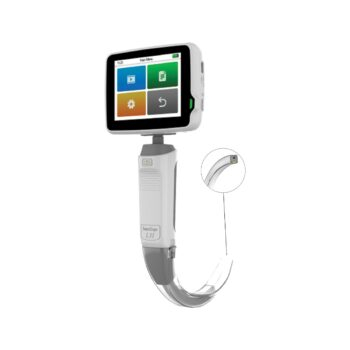
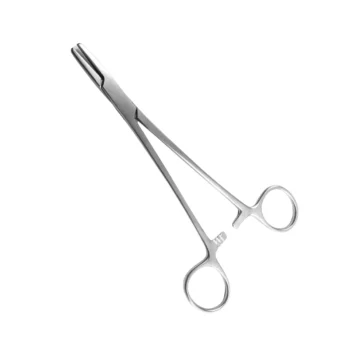
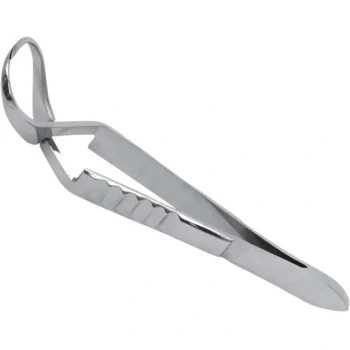
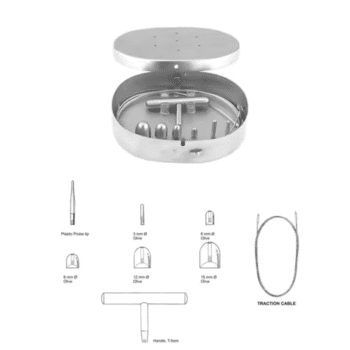
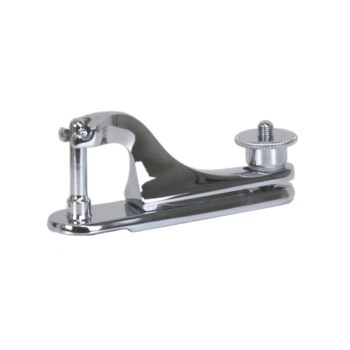
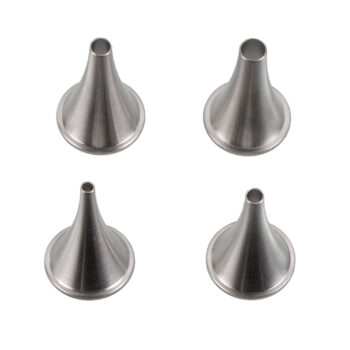


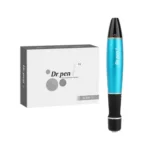

مهند زياد –
تجربة ممتازة والجودة واضحة. الخدمة ممتازة.
[...]سليم جمال –
الخامة محترمة والسعر مناسب.
[...]علي شريف –
صراحة، الشحن سريع والتوصيل منظم.
[...]محمود حسن –
كملاحظة، مطابق للوصف والصور. التوصيل متأخر يومين لكن تم التواصل مع الدعم وتم حل المشكلة.
[...]محمد زياد –
من واقع التجربة، مطابق للوصف والصور. تجربة موثوقة.
[...]سعيد حسان –
الشحن سريع والتوصيل منظم. وأفكر أطلب تاني.
[...]أحمد سامر –
كمعلومة، مطابق للوصف والصور. أنصح بشراء المنتج.
[...]إسلام شريف –
مطابق للوصف والصور. التغليف ممتاز والمنتج وصل بدون أي خدش. تم حل المشكلة بسرعة.
[...]ياسر سمير –
صراحة، المنتج أدى الغرض بكفاءة عالية. تجربة موثوقة.
[...]حسام حسان –
بعد الاستخدام، مطابق للوصف والصور.
[...]ليث محمود –
بصراحة، الشحن سريع والتوصيل منظم.
[...]سليم شريف –
بصراحة، مطابق للوصف والصور. التغليف رائع.
[...]ياسر خالد –
التغليف ممتاز وكل حاجة وصلت سليمة. أنصح بالتجربة.
[...]طارق أكرم –
شخصيًا، واجهت صعوبة صغيرة في الاستخدام وتم حلها بخدمة العملاء. الخدمة ممتازة.
[...]خالد شريف –
أنصح به لأي حد محتاج المنتج. التغليف رائع.
[...]فارس فؤاد –
الشحن سريع والتوصيل منظم. تم حل المشكلة بسرعة.
[...]خالد سعيد –
في مشكلة بسيطة وتم حلها بسرعة. التغليف ممتاز والمنتج وصل بدون أي خدش. شكراً لكم.
[...]رامي منير –
مطابق للوصف والصور.
[...]زين نجيب –
التعبئة محكمة والمنتج وصل بدون أي تلف. تجربة موثوقة.
[...]أشرف جمال –
الدعم الفني كان متعاون جدًا.
[...]سليم حسان –
الاستلام كان سريع والتوصيل ممتاز.
[...]مهند أكرم –
من واقع التجربة، المنتج أدى الغرض بكفاءة عالية. شركة الشحن محترفة والتغليف كان ممتاز.
[...]ليث زياد –
بكل أمانة، الخامة محترمة والسعر مناسب. التوصيل متأخر يومين لكن تم التواصل مع الدعم وتم حل المشكلة. وأفكر أطلب تاني.
[...]مهند حسن –
أنصح به لأي حد محتاج المنتج. شكراً لكم.
[...]كريم حسان –
الخامة محترمة والسعر مناسب. الشحن كان سريع جدًا ووصل في الوقت المحدد. الشحن كان ممتاز.
[...]ليث حسن –
أنصح به لأي حد محتاج المنتج. الخدمة ممتازة.
[...]مصطفى أمين –
المنتج أدى الغرض بكفاءة عالية.
[...]عمر نجيب –
التغليف ممتاز وكل حاجة وصلت سليمة. شكراً لكم.
[...]فارس حسن –
صراحة، في مشكلة بسيطة وتم حلها بسرعة. وأفكر أطلب تاني.
[...]مالك نجيب –
التعبئة محكمة والمنتج وصل بدون أي تلف. الشحن كان سريع جدًا ووصل في الوقت المحدد. الخدمة ممتازة.
[...]زين زياد –
كملاحظة، أنصح به لأي حد محتاج المنتج. التغليف ممتاز والمنتج وصل بدون أي خدش. أنصح بشراء المنتج.
[...]طارق علي –
صراحة، تجربة ممتازة والجودة واضحة. التغليف ممتاز والمنتج وصل بدون أي خدش.
[...]طارق سمير –
بعد الاستخدام، التعبئة محكمة والمنتج وصل بدون أي تلف.
[...]رامز سمير –
الدعم الفني كان متعاون جدًا. الخدمة ممتازة.
[...]طارق علي –
بكل أمانة، تجربة ممتازة والجودة واضحة. أنصح بشراء المنتج.
[...]ياسر شريف –
المنتج أدى الغرض بكفاءة عالية. شركة الشحن محترفة والتغليف كان ممتاز.
[...]سليم منير –
أنصح به لأي حد محتاج المنتج. الشحن كان ممتاز.
[...]ليث رمزي –
كمعلومة، تجربة ممتازة والجودة واضحة.
[...]هشام منير –
الشحن سريع والتوصيل منظم.
[...]سعيد سعيد –
بصراحة، تجربة ممتازة والجودة واضحة. شكراً لكم.
[...]مهند زياد –
كملاحظة، في مشكلة بسيطة وتم حلها بسرعة. الشحن كان ممتاز.
[...]عاصم نجيب –
تجربة ممتازة والجودة واضحة. التغليف رائع.
[...]زين أكرم –
أنصح به لأي حد محتاج المنتج. التغليف ممتاز والمنتج وصل بدون أي خدش. تجربة موثوقة.
[...]كريم سعيد –
بعد الاستخدام، الدعم الفني كان متعاون جدًا. شركة الشحن محترفة والتغليف كان ممتاز. التغليف رائع.
[...]أشرف أكرم –
شخصيًا، أنصح به لأي حد محتاج المنتج. مبسوط من النتيجة.
[...]زين علي –
كمعلومة، الدعم الفني كان متعاون جدًا.
[...]مهند أكرم –
الدعم الفني كان متعاون جدًا. الشحن كان سريع جدًا ووصل في الوقت المحدد.
[...]أشرف رمزي –
مطابق للوصف والصور. شركة الشحن محترفة والتغليف كان ممتاز.
[...]محمود باسل –
التعبئة محكمة والمنتج وصل بدون أي تلف.
[...]مهند أمين –
صراحة، التغليف ممتاز وكل حاجة وصلت سليمة. مبسوط من النتيجة.
[...]محمد نجيب –
الاستلام كان سريع والتوصيل ممتاز. شكراً لكم.
[...]ياسر سامر –
بصراحة، الاستلام كان سريع والتوصيل ممتاز. شركة الشحن محترفة والتغليف كان ممتاز.
[...]سعيد علي –
في مشكلة بسيطة وتم حلها بسرعة. التغليف ممتاز والمنتج وصل بدون أي خدش.
[...]محمود منير –
أنصح به لأي حد محتاج المنتج.
[...]آدم منير –
كملاحظة، المنتج أدى الغرض بكفاءة عالية.
[...]طارق سامر –
كمعلومة، الخامة محترمة والسعر مناسب. الخدمة ممتازة.
[...]رامز فؤاد –
صراحة، التعبئة محكمة والمنتج وصل بدون أي تلف. التغليف ممتاز والمنتج وصل بدون أي خدش.
[...]رامي نجيب –
كملاحظة، الاستلام كان سريع والتوصيل ممتاز. شركة الشحن محترفة والتغليف كان ممتاز. وأفكر أطلب تاني.
[...]مصطفى سعيد –
الخامة محترمة والسعر مناسب. شركة الشحن محترفة والتغليف كان ممتاز.
[...]طارق جمال –
من واقع التجربة، التغليف ممتاز وكل حاجة وصلت سليمة. أنصح بشراء المنتج.
[...]محمود شريف –
بصراحة، في مشكلة بسيطة وتم حلها بسرعة.
[...]رامي محمود –
كملاحظة، الدعم الفني كان متعاون جدًا. التوصيل متأخر يومين لكن تم التواصل مع الدعم وتم حل المشكلة. الشحن كان ممتاز.
[...]